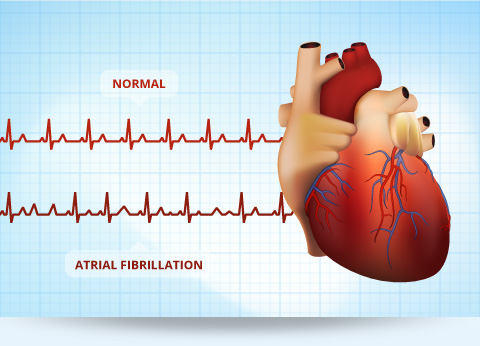- Home
- Editorial
- News
- Practice Guidelines
- Anesthesiology Guidelines
- Cancer Guidelines
- Cardiac Sciences Guidelines
- Critical Care Guidelines
- Dentistry Guidelines
- Dermatology Guidelines
- Diabetes and Endo Guidelines
- Diagnostics Guidelines
- ENT Guidelines
- Featured Practice Guidelines
- Gastroenterology Guidelines
- Geriatrics Guidelines
- Medicine Guidelines
- Nephrology Guidelines
- Neurosciences Guidelines
- Obs and Gynae Guidelines
- Ophthalmology Guidelines
- Orthopaedics Guidelines
- Paediatrics Guidelines
- Psychiatry Guidelines
- Pulmonology Guidelines
- Radiology Guidelines
- Surgery Guidelines
- Urology Guidelines
Drinking alcohol daily may enlarge heart chamber; lead to atrial fibrillation : AHA Study

Study Highlights: Daily, long-term alcohol consumption was associated with a five percent higher risk of developing atrial fibrillation. Part of the underlying mechanism may be due to enlargement of upper left heart chamber.
Study Highlights
- Daily, long-term alcohol consumption was associated with a five percent higher risk of developing atrial fibrillation.
- Part of the underlying mechanism may be due to enlargement of upper left heart chamber.
Dallas : Despite the common perception that moderate alcohol intake is good for the heart, new research suggests long-term alcohol consumption, even as little as one drink a day may enlarge the heart’s left upper chamber (atrium) and increase the risk of developing atrial fibrillation, according to new research in Journal of the American Heart Association, the Open Access Journal of the American Heart Association/American Stroke Association.
“Our study provides the first human evidence of why daily, long-term alcohol consumption may lead to the development of this very common heart rhythm disturbance,” said Gregory Marcus, M.D., senior study author and associate professor of medicine specializing in cardiac electrophysiology at the University of California at San Francisco. “We were somewhat surprised that a relatively small amount of alcohol was associated with a larger left atrium and subsequent atrial fibrillation.”
Atrial fibrillation is a common condition in which the heart beats irregularly and fails to properly pump blood, increasing the risk for stroke and blood clots. Previous research has shown associations between drinking alcohol and ventricular cardiomyopathy (heart has trouble pumping and delivering blood to the rest of the body).
Researchers analyzed data on 5,220 participants from the Framingham Heart Study, an ongoing national research project in the United States. Participants (54 percent women, average age 56) underwent electrocardiograms (EKG) to measure electrical activity of the heart. Of 17,659 EKG scans taken over six years, researchers detected 1,088 incidences of atrial fibrillation.
They also found:
- Chronic alcohol consumption was also associated with higher risk for incident atrial fibrillation.
- Every 10 grams per day of alcohol (one drink a day) consumed was associated with a 5 percent higher risk of developing new-onset atrial fibrillation.
- Every additional 10 grams of alcohol a day was linked to a 0.16 millimeter larger left atrium (one of the four chambers of the heart).
- Approximately 24 percent, and up to 75 percent, of the relationship between regular alcohol consumption and atrial fibrillation risk could be traced back to enlargement of the left atria.
Researchers said the relationship between atrial fibrillation and alcohol consumption remained even after considering other heart health risk factors, such as high blood pressure, diabetes, or smoking.
These observational findings do not suggest that drinking alcohol directly causes heart problems. However, researchers said their results question the popular consumer belief that alcohol benefits the heart.
“Our data suggest atrial fibrillation might be prevented by avoiding alcohol however, just as alcohol likely has variable effects on individuals, there are almost certainly various mechanistic sub types of atrial fibrillation. It’s not one size fits all when it comes to the effects of alcohol and heart health,” Marcus said.
How regular alcohol consumption may be influencing the size of the left atria or the heart’s electrical activity is unclear and warrants further investigation. “Our hope,” Marcus said, “is that by understanding the mechanistic relationship between alcohol and atrial fibrillation we might learn something inherent to atrial fibrillation in general that could help identify new ways of understanding and treating the disease.”
The American Heart Association recommends consuming alcohol in moderation if you already drink but cautions people to not start drinking and consult your doctor on your risks and benefits of consuming alcohol in moderation.
Co-authors are David McManus, M.D.; Xiaoyan Yin, Ph.D.; Rachel Gladstone, B.S.; Eric Vittinghoff, Ph.D.; Ramachandran Vasan, M.B.B.S, M.D., D.M.; Martin Larson, S.D., and Emelia Benjamin, M.D., Sc.M. Author disclosures are on the manuscript.
The National Institute on Alcohol Abuse and Alcoholism of the National Institutes of Health and the National Heart, Lung and Blood Institute funded the study.

Disclaimer: This site is primarily intended for healthcare professionals. Any content/information on this website does not replace the advice of medical and/or health professionals and should not be construed as medical/diagnostic advice/endorsement or prescription. Use of this site is subject to our terms of use, privacy policy, advertisement policy. © 2020 Minerva Medical Treatment Pvt Ltd